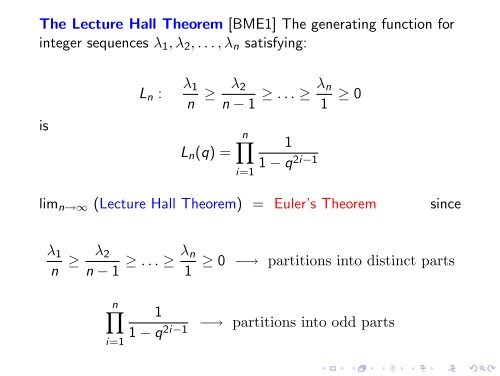Euler's partition theorem and the combinatorics of -sequences
Euler's partition theorem and the combinatorics of -sequences Euler's partition theorem and the combinatorics of -sequences
The Lecture Hall Theorem [BME1] The generating function for integer sequences λ 1 , λ 2 , . . . , λ n satisfying: is L n : λ 1 n ≥ λ 2 n − 1 ≥ . . . ≥ λ n 1 ≥ 0 L n (q) = n∏ i=1 1 1 − q 2i−1
The Lecture Hall Theorem [BME1] The generating function for integer sequences λ 1 , λ 2 , . . . , λ n satisfying: is L n : λ 1 n ≥ λ 2 n − 1 ≥ . . . ≥ λ n 1 ≥ 0 L n (q) = n∏ i=1 1 1 − q 2i−1 lim n→∞ (Lecture Hall Theorem) = Euler’s Theorem since λ 1 n ≥ λ 2 n − 1 ≥ . . . ≥ λ n 1 n∏ i=1 ≥ 0 −→ partitions into distinct parts 1 −→ partitions into odd parts 1 − q2i−1
- Page 1 and 2: Euler’s partition theorem and the
- Page 3 and 4: Overview Euler’s partition theore
- Page 5 and 6: Overview 1, 2, 3, . . . l-sequences
- Page 7 and 8: Overview 1, 2, 3, . . . l-sequences
- Page 9 and 10: Sylvester’s Bijection
- Page 11 and 12: l-sequences For integer l ≥ 2, de
- Page 13 and 14: l-sequences For integer l ≥ 2, de
- Page 15 and 16: l = 2 The l-Euler theorem [BME2]: T
- Page 17 and 18: l = 3 The l-Euler theorem [BME2]: T
- Page 19: The insertion step To insert a k +
- Page 22 and 23: Binary numeration system 1 0 1 1 0
- Page 24 and 25: Binary numeration system 1 0 1 1 0
- Page 26: Theorem [Fraenkel 1985] Every nonne
- Page 31: Lecture Hall Partitions
- Page 35 and 36: Θ (l) n : Bijection for the l-Lect
- Page 44 and 45: Truncated lecture hall partitions L
- Page 46 and 47: Theorem [Corteel,S 2004] Given posi
- Page 48 and 49: The l-nomial coefficient Example (
- Page 50 and 51: Let u l and v l be the roots of the
- Page 52 and 53: Let u l and v l be the roots of the
- Page 54 and 55: An l-nomial theorem [LS]: An analog
- Page 56 and 57: A coin-flipping interpretation of t
- Page 58 and 59: Define a q-analog of the l-nomial:
- Page 60 and 61: Another q-analog of the l-nomial Le
- Page 62 and 63: Question: When l = 2, several refin
- Page 64 and 65: Question: What is the generating fu
- Page 66 and 67: CanaDAM 2009 2nd Canadian Discrete
The Lecture Hall Theorem [BME1] The generating function for<br />
integer <strong>sequences</strong> λ 1 , λ 2 , . . . , λ n satisfying:<br />
is<br />
L n :<br />
λ 1<br />
n ≥ λ 2<br />
n − 1 ≥ . . . ≥ λ n<br />
1 ≥ 0<br />
L n (q) =<br />
n∏<br />
i=1<br />
1<br />
1 − q 2i−1<br />
lim n→∞ (Lecture Hall Theorem) = Euler’s Theorem<br />
since<br />
λ 1<br />
n ≥ λ 2<br />
n − 1 ≥ . . . ≥ λ n<br />
1<br />
n∏<br />
i=1<br />
≥ 0 −→ <strong>partition</strong>s into distinct parts<br />
1<br />
−→ <strong>partition</strong>s into odd parts<br />
1 − q2i−1



